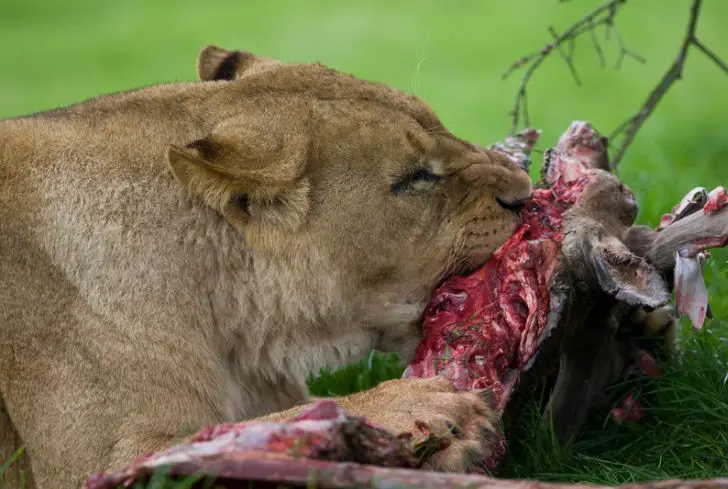Lions are majestic creatures that have been a source of captivation for centuries. They are known for their strength, predatory instincts, and social behavior, but many people still wonder about the kind of senses lions have. Can lions smell blood, and how far can they smell blood?
This post explores lions’ various senses and answers some common questions about their abilities. From their keen sense of smell to their excellent vision and emotional capabilities, we will uncover the mysteries you have been urging about these fascinating animals. Dig in!
Read: Do Sharks Have Emotions and Feelings?
Contents
Can Lions Smell Blood?
Yes, lions can smell blood. Their sense of smell is highly developed and essential for hunting and finding food. Lions have a keen sense of smell that allows them to detect the presence of blood from a distance.
Moreover, lions detect the presence of blood through their olfactory bulbs located in the brain. These bulbs are responsible for processing smells.
Besides, lions have larger bulbs than most other cats, indicating the importance of their sense of smell in their daily lives.
Lions can also identify the specific type of animal the blood came from based on its unique scent.
How Far Can Lions Smell Blood?
Lions have a highly developed sense of smell and can detect the presence of blood from a relatively long distance, up to several miles away. This ability is beneficial for lions living in areas where prey is scarce. It allows them to locate potential food sources from a distance quickly.
Lion’s ability to smell blood depends on scent concentration, wind direction, and interference. However, lions have a strong sense of smell and can detect the presence of blood from a significant distance. Generally, how far a lion can smell blood keeps changing due to the underlying factors.
Can Lions Smell Fear?
Yes, lions can detect the presence of fear in other animals through their sense of smell. When an animal is frightened, it releases certain chemicals called pheromones. These pheromones are detectable by the lion’s sense of smell, allowing it to identify prey that is likely more vulnerable or easier to catch.
Besides, lions are also able to identify the specific type of animal that is fearful based on the unique scent of its pheromones. This ability can be handy for lions when hunting in groups.
It allows them to coordinate their efforts and target the most vulnerable prey. While lions can detect the presence of fear in other animals, they do not necessarily rely on this sense to locate prey.
Also, lions have a range of senses that they use to locate and hunt prey, including their vision, hearing, and sense of smell.
Can Lions Smell Prey?
Yes, lions can smell prey. Their sense of smell is highly developed and essential for hunting and finding food. Lions use their sense of smell to locate prey, even when it is hidden or camouflaged.
Lions can detect the presence of prey from a distance and track it until they are close enough to attack.
These creatures have several adaptations that enhance their sense of smell, including a well-developed olfactory bulb in the brain and many olfactory receptors in the nose. These adaptations allow lions to process smells more efficiently and accurately, enabling them to locate prey even when it is hidden or far away.
Similarly, lions can identify the specific type of animal they are tracking based on the unique scent of its pheromones. This ability allows lions to target specific prey species. Also, it helps them to avoid wasting energy on animals that are not suitable for hunting.

Do Lions Drink Blood?
Yes, lions consume their prey’s blood occasionally after a kill. Besides, they do not regularly drink blood as a source of hydration or nutrition. For them, it is a way of obtaining additional nutrients or cleaning the prey animal’s wounds.
Prey’s blood helps lions clean and close the animal’s wounds, preventing infections or other complications. Besides, they do not rely on it as a primary source of hydration or nutrition. Lions primarily consume their prey’s flesh, providing them with the nutrients and water needed to survive.
Do Lions Smell Bad?
Lions do not have a particularly strong or unpleasant smell. They are generally considered to have a relatively mild scent. However, their scent may become stronger when they are in a rut (the mating season) or when they are marking their territory.
During the rut, male lions produce a strong scent from glands in their faces and paws. This scent is used to attract females and to mark their territory. Female lions also produce a scent during the rut, although it is generally less intense than the scent produced by males.
Lions also mark their territory by rubbing their face and body against trees, bushes, and other objects. This behavior leaves behind a scent that helps to deter other lions from entering their territory. The scent of lions during territorial marking is generally more potent and intense than its natural scent.
Do Lions Have a Good Vision?
Yes, lions have an excellent vision adapted for hunting. They can see well in low and bright light conditions, making them effective predators day and night. Also, lions can detect the movement of prey from a distance, which allows them to judge distances accurately when attacking.
Lions have adaptations that enhance their vision, including a tapetum lucidum, a layer of reflective cells behind the retina. This layer helps to reflect light through the retina, improving the lion’s ability to see in low-light conditions. Lions also have relatively large pupils, which allows them to let in more light and improve their vision in dark environments.
Do Lions Have a Good Sense of Smell?
Yes, lions have a highly developed sense of good and bad smells. It is an essential tool for hunting and finding food, allowing lions to identify prey’s smell quickly. Their sense of smell is so sensitive that they can detect the presence of blood and prey from a distance.
Besides, lions have a relatively sizeable nasal cavity, which provides more space for the olfactory receptors to detect smells. They also have a relatively long and flexible snout, allowing them to direct their nose towards different scents and better detect the direction and distance of a particular smell.
Additionally, lions often lift their head and flare their nostrils when detecting a smell, which helps draw more air into their nasal cavity and improve their ability to detect scents.
Do Lions Have Emotions?
Yes, lions have a range of emotions, including joy, sadness, anger, and fear. Like other social animals, they can form strong bonds with each other and humans. They can also show affection and express many other emotions through body language and vocalizations.
Lions are highly social animals and live in groups called pride. Within the pride, lions form close bonds and relationships with one another. They can express a range of emotions towards their group members.
For example, lions often show affection towards each other through grooming behaviors and physical contact.
Read: Can Giraffes Climb Trees?
Bottom Line
Generally, lions are genuinely remarkable animals with a wide range of abilities and senses that help them survive in the wild. They are known for their strength and predatory skills and are also intelligent and emotionally complex creatures with a rich social life.
We have seen how lions have a highly developed sense of smell, including the ability to detect blood. Besides, their excellent vision and hearing are vital for locating prey and communicating with other pride members.
Lastly, this post has discussed various lion emotions, including love, joy, and grief and has helped us to understand this fascinating and multifaceted species that deserve our respect and admiration.







